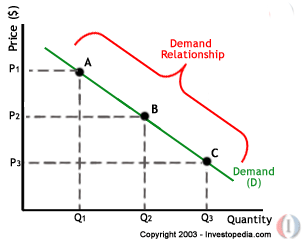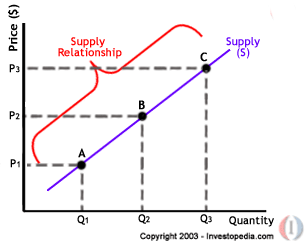Law of Demand states that as the price of a product falls, the quantity demanded of the product will usually increase, all other things being equal (ceteris paribus). And if the price of the product rises, the quantity demanded decreases. For example, if the price of pizza increased from $3 to $5 people would not want to buy more expensive pizza so the quantity demanded will decrease.
Law of Supply states that the higher the price of the product, the higher quantity supplied is needed. Producers supply more at a higher price because selling a higher quantity at a higher price brings a bigger profit. For example, when the price of hats decreases from $15 to $8 the seller would not want to sell much of his products for a lower price so he decreases the quantity supplied.
However, laws of demand and supply, like other things in life, are not certain and do not always work. Two interesting examples of good to which the laws do not apply are Veblen goods and Giffen goods.
 Veblen goods are goods that remain exclusive and highly demanded only when the price is high. They are also reffered to "status goods" that hold cetrain prestige. These goods are named after an economist Thoreist Veblen, who was one of the first to look into and write about conspicuous consumption and the concept of seeking status through consumption. The example of Veblen goods are for example expensive cars. When the price of for example Lamborghini goes up, the demand increases too because the more expensive is the car the bigger is the interest of people who want this car as a "status symbol".
Veblen goods are goods that remain exclusive and highly demanded only when the price is high. They are also reffered to "status goods" that hold cetrain prestige. These goods are named after an economist Thoreist Veblen, who was one of the first to look into and write about conspicuous consumption and the concept of seeking status through consumption. The example of Veblen goods are for example expensive cars. When the price of for example Lamborghini goes up, the demand increases too because the more expensive is the car the bigger is the interest of people who want this car as a "status symbol".
 Giffen good is a consumer good for which demand rises when the price increases, and demand falls when the price decreases. This phenomenon is notable because it violates the law of demand, whereby demand should increase as price falls and decrease as price rises. To be a Giffen good, the item must lack easy subsitutes and it must be an inferior good, or a good for which demand declines as the level of income in the economy increases. An example of Giffen good can be rice. Households in the Hunan province of China were shown to buy more rice when they had to buy it at a higher price, and less when the price they paid was subsidised. The reason for this is that, even when expensive, rice was still the cheapest source of calories available. Therefore, when the price of rice was cut, households had more money left over after buying rice. Some of this was spent on buying more expensive foods (meat, vegetables and fruit), which reduced their need for rice.
Giffen good is a consumer good for which demand rises when the price increases, and demand falls when the price decreases. This phenomenon is notable because it violates the law of demand, whereby demand should increase as price falls and decrease as price rises. To be a Giffen good, the item must lack easy subsitutes and it must be an inferior good, or a good for which demand declines as the level of income in the economy increases. An example of Giffen good can be rice. Households in the Hunan province of China were shown to buy more rice when they had to buy it at a higher price, and less when the price they paid was subsidised. The reason for this is that, even when expensive, rice was still the cheapest source of calories available. Therefore, when the price of rice was cut, households had more money left over after buying rice. Some of this was spent on buying more expensive foods (meat, vegetables and fruit), which reduced their need for rice.
Law of Supply states that the higher the price of the product, the higher quantity supplied is needed. Producers supply more at a higher price because selling a higher quantity at a higher price brings a bigger profit. For example, when the price of hats decreases from $15 to $8 the seller would not want to sell much of his products for a lower price so he decreases the quantity supplied.
However, laws of demand and supply, like other things in life, are not certain and do not always work. Two interesting examples of good to which the laws do not apply are Veblen goods and Giffen goods.
 Veblen goods are goods that remain exclusive and highly demanded only when the price is high. They are also reffered to "status goods" that hold cetrain prestige. These goods are named after an economist Thoreist Veblen, who was one of the first to look into and write about conspicuous consumption and the concept of seeking status through consumption. The example of Veblen goods are for example expensive cars. When the price of for example Lamborghini goes up, the demand increases too because the more expensive is the car the bigger is the interest of people who want this car as a "status symbol".
Veblen goods are goods that remain exclusive and highly demanded only when the price is high. They are also reffered to "status goods" that hold cetrain prestige. These goods are named after an economist Thoreist Veblen, who was one of the first to look into and write about conspicuous consumption and the concept of seeking status through consumption. The example of Veblen goods are for example expensive cars. When the price of for example Lamborghini goes up, the demand increases too because the more expensive is the car the bigger is the interest of people who want this car as a "status symbol". Giffen good is a consumer good for which demand rises when the price increases, and demand falls when the price decreases. This phenomenon is notable because it violates the law of demand, whereby demand should increase as price falls and decrease as price rises. To be a Giffen good, the item must lack easy subsitutes and it must be an inferior good, or a good for which demand declines as the level of income in the economy increases. An example of Giffen good can be rice. Households in the Hunan province of China were shown to buy more rice when they had to buy it at a higher price, and less when the price they paid was subsidised. The reason for this is that, even when expensive, rice was still the cheapest source of calories available. Therefore, when the price of rice was cut, households had more money left over after buying rice. Some of this was spent on buying more expensive foods (meat, vegetables and fruit), which reduced their need for rice.
Giffen good is a consumer good for which demand rises when the price increases, and demand falls when the price decreases. This phenomenon is notable because it violates the law of demand, whereby demand should increase as price falls and decrease as price rises. To be a Giffen good, the item must lack easy subsitutes and it must be an inferior good, or a good for which demand declines as the level of income in the economy increases. An example of Giffen good can be rice. Households in the Hunan province of China were shown to buy more rice when they had to buy it at a higher price, and less when the price they paid was subsidised. The reason for this is that, even when expensive, rice was still the cheapest source of calories available. Therefore, when the price of rice was cut, households had more money left over after buying rice. Some of this was spent on buying more expensive foods (meat, vegetables and fruit), which reduced their need for rice. 

No comments:
Post a Comment